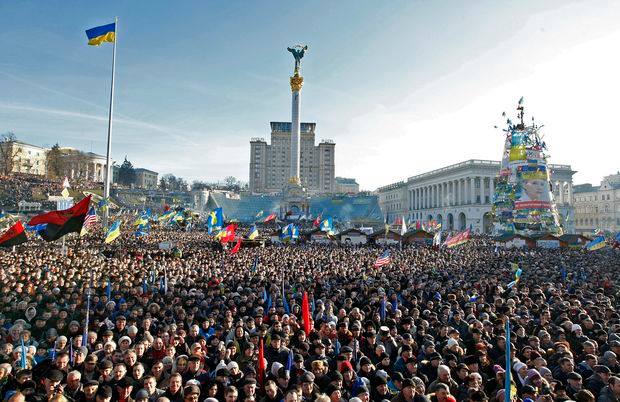Nation, national identity and nationalism: Constructivism versus essentialism
Contents
 In France, as long ago as 1882, Ernest Renan turned against essentialistic definitions in his famous speech at the Sorbonne about the concept of ‘nation’[28], and contrasted his concept of the ‘free will of citizens’ with the ‘German’ primordial concept: A community of citizens of differing ethnic backgrounds forms a ‘nation’ (a ‘nation of will’, a ‘nation by choice’, Germ.: Willensnation) based on the citizens’ shared memories of the past – and based on their desire to live together in the future (‘daily plebiscite’). A nation is the product of a historical process: the past, the present and the future are the key factors which constitute the principe spirituel of a nation.
Thus, according to Renan, national identity evolves from collective historical memory. A large part of the population in eastern Ukraine, however, does not share a common historical memory with the people of western Ukraine over the central event in recent world history: World War II. The other factor, the ‘daily agreement to live together in the future’, is exactly what the minority separatists in the Donbas do not want.
Nowadays, Renan’s concept of a ‘collective memory’ and Anderson’s concept of the ‘imagined community’ are considered to be the essential components for the understanding of the concept of national identity. According to the concept of Jan Assmann, who combines these two components, societies imagine self-images that form through generations as a cultural memory, and thus construct an identity..[29] As a common imagination consisting of shared memories, national identity is a cultural and not a political construction. And just like personal identity, national identity is constructed narratively.
Formerly characteristic features of national identities are no longer distinguishing criteria. National cultures are being homogenized through globalization. Today’s European nations differ in practical terms only in mentalities. Nevertheless – or perhaps for this very reason – the search for national identity is back in fashion. Today’s France, for example, questions its traditional assimilation policy in view of a ‘critical mass’ of immigrants from other cultural backgrounds. In 2009, the French Minister for Immigration and National Identity Eric Besson[30] initiated a campaign on the issue of ‘national identity’. All of France participated in a discussion around the question: “What does it mean to be French?” Henri Guaino, special advisor to President Sarkozy, explained to the German weekly newspaper Die Zeit: ‘If the sense of belonging to a nation were a matter of course nowadays, then there would be no need for a debate. But if one finds oneself in a situation of uncertainty about what the ‘nation’ is, in a crisis of identity, in a crisis of orientation, then identity becomes a subject of political debate.’[31] By asking questions regarding the very ‘essence’ of the nation, the government of France turned away from the hitherto valid French concept of nation, as formulated by Ernest Renan, and turned towards the essentialist (‘German’) concept.
Meanwhile, the German publicist Michael Böhm believes that national identity has vanished.[32] He argues that under the conditions of global migration and inter-cultural marriages, the essentially ‘pre-political’ and ‘pre-legal’ idea of the identity of a nation has completely lost its plausibility. In fact, however, the importance of national identity has not declined, either because of individualization, or because of globalization, or as a result of supra-national unification processes such as the European Union. Elections to the European Parliament demonstrate this fact, with Euro-skeptic and nationalist parties gaining an increasingly high share of votes. Economic and social problems have provoked the renaissance of primordial nationalism of a kind which had long been dismissed as outdated throughout Europe and also in Russia.
Primordial nationalism implies a comparison with other nations; it accentuates the characteristics of a nation in contrast to other nations. This does not per se mean disregard for others, but it does set one’s own nation apart from other nations. The anthropological concept of an ethnically homogeneous nation, a ‘people’ as a (biological) ‘descent community’, which almost inevitably leads to calls for ethnic cleansing, did not die out completely with the military defeat of Nazi Germany in 1945. It remains very much alive in ‘folkish’ (Germ.: völkisch) delusions and the desire to protect minorities of compatriots abroad (Germ.: Volksdeutsche; Russ.: sootechestvenniki) by force of arms from alleged discrimination by the titular nation.
The raging nationalism of a large majority of Russians – inflamed by Russian President Putin and fanned by the Russian media – proves the continuing susceptibility of nations to aggressive nationalism. The process of national self-assertion in Ukraine, which was initiated by the Maidan movement, now risks appearing anachronistic. However, the catch-up consolidation of a national – and European – identity at the present time makes sense because it distances Ukraine from its Soviet identity – and from Putin’s Russia.
In France, as long ago as 1882, Ernest Renan turned against essentialistic definitions in his famous speech at the Sorbonne about the concept of ‘nation’[28], and contrasted his concept of the ‘free will of citizens’ with the ‘German’ primordial concept: A community of citizens of differing ethnic backgrounds forms a ‘nation’ (a ‘nation of will’, a ‘nation by choice’, Germ.: Willensnation) based on the citizens’ shared memories of the past – and based on their desire to live together in the future (‘daily plebiscite’). A nation is the product of a historical process: the past, the present and the future are the key factors which constitute the principe spirituel of a nation.
Thus, according to Renan, national identity evolves from collective historical memory. A large part of the population in eastern Ukraine, however, does not share a common historical memory with the people of western Ukraine over the central event in recent world history: World War II. The other factor, the ‘daily agreement to live together in the future’, is exactly what the minority separatists in the Donbas do not want.
Nowadays, Renan’s concept of a ‘collective memory’ and Anderson’s concept of the ‘imagined community’ are considered to be the essential components for the understanding of the concept of national identity. According to the concept of Jan Assmann, who combines these two components, societies imagine self-images that form through generations as a cultural memory, and thus construct an identity..[29] As a common imagination consisting of shared memories, national identity is a cultural and not a political construction. And just like personal identity, national identity is constructed narratively.
Formerly characteristic features of national identities are no longer distinguishing criteria. National cultures are being homogenized through globalization. Today’s European nations differ in practical terms only in mentalities. Nevertheless – or perhaps for this very reason – the search for national identity is back in fashion. Today’s France, for example, questions its traditional assimilation policy in view of a ‘critical mass’ of immigrants from other cultural backgrounds. In 2009, the French Minister for Immigration and National Identity Eric Besson[30] initiated a campaign on the issue of ‘national identity’. All of France participated in a discussion around the question: “What does it mean to be French?” Henri Guaino, special advisor to President Sarkozy, explained to the German weekly newspaper Die Zeit: ‘If the sense of belonging to a nation were a matter of course nowadays, then there would be no need for a debate. But if one finds oneself in a situation of uncertainty about what the ‘nation’ is, in a crisis of identity, in a crisis of orientation, then identity becomes a subject of political debate.’[31] By asking questions regarding the very ‘essence’ of the nation, the government of France turned away from the hitherto valid French concept of nation, as formulated by Ernest Renan, and turned towards the essentialist (‘German’) concept.
Meanwhile, the German publicist Michael Böhm believes that national identity has vanished.[32] He argues that under the conditions of global migration and inter-cultural marriages, the essentially ‘pre-political’ and ‘pre-legal’ idea of the identity of a nation has completely lost its plausibility. In fact, however, the importance of national identity has not declined, either because of individualization, or because of globalization, or as a result of supra-national unification processes such as the European Union. Elections to the European Parliament demonstrate this fact, with Euro-skeptic and nationalist parties gaining an increasingly high share of votes. Economic and social problems have provoked the renaissance of primordial nationalism of a kind which had long been dismissed as outdated throughout Europe and also in Russia.
Primordial nationalism implies a comparison with other nations; it accentuates the characteristics of a nation in contrast to other nations. This does not per se mean disregard for others, but it does set one’s own nation apart from other nations. The anthropological concept of an ethnically homogeneous nation, a ‘people’ as a (biological) ‘descent community’, which almost inevitably leads to calls for ethnic cleansing, did not die out completely with the military defeat of Nazi Germany in 1945. It remains very much alive in ‘folkish’ (Germ.: völkisch) delusions and the desire to protect minorities of compatriots abroad (Germ.: Volksdeutsche; Russ.: sootechestvenniki) by force of arms from alleged discrimination by the titular nation.
The raging nationalism of a large majority of Russians – inflamed by Russian President Putin and fanned by the Russian media – proves the continuing susceptibility of nations to aggressive nationalism. The process of national self-assertion in Ukraine, which was initiated by the Maidan movement, now risks appearing anachronistic. However, the catch-up consolidation of a national – and European – identity at the present time makes sense because it distances Ukraine from its Soviet identity – and from Putin’s Russia.
Patriotism or ‘positive nationalism’?

One might also mention that modern national consciousness, as emerged from the French Revolution (1789-1799), was originally emancipatory – in the sense that it implied overcoming class boundaries. In the Wars of Liberation (1813-1815), Germans were gripped by an unprecedented patriotism, which expressed itself in the desire for a united nation state. Until the ‘March Revolution’ of 1848-49, the ‘yearning for national unity’ allied itself with the ‘fight for freedom’ and for democracy. During the ‘Second Empire’, after the ‘(Smaller) German’ unification (1871), this liberal, republican patriotism[34] changed into a presumptuous nationalism.[35] Around the end of the 19th century, the concept of ‘cultural nation’ (Germ.: Kulturnation, Friedrich Meinecke) became popular in Germany,[36] which defined ‘nation’ less in categories of (political and military) power, but rather through a common culture,[37] a term by means of which the national sentiment of the ‘delayed nation’ (Germany) could be conceptually grasped. It had a slightly conceited overtone.[38] During the so-called Third Reich, under the rule of Adolf Hitler, the imperial nationalism of the Second Empire degenerated completely into a totalitarian ideology[39] – into psychopathic racism. After the military defeat of National-Socialist Germany in 1945, ‘patriotism’ became a ‘non-word’ because of its previous belligerent misuse. A positive identification with the German nation became taboo. As a result of these attitudes, a considerable part of society in West Germany rejected German Reunification in 1990. The concept of ‘constitutional patriotism” (Germ.: Verfassungspatriotismus), unknown outside the Federal Republic of Germany, as propagated by Dolf Sternberger and Jürgen Habermas, is incongruous, since the constitutions of all modern democratic states resemble each other. Universal human rights and basic values, political institutions and processes are anchored in all of them. Differences relating to state structure – federalism or centralism – do not constitute an emotional basis for patriotism.A patriot loves his fatherland. A nationalist despises the fatherlands of others




